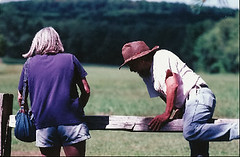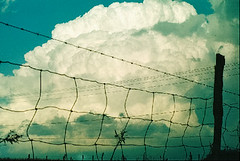Audience, Meet Screen; Screen, Meet Audience...
The title of this post notwithstanding, the subject I'm about to broach has more to do with real life than cinema. It seems that we are at a crossroads of sorts on the blogosphere. A lot of debate and vacillation has been taking place on the act of film criticism and what it means to people, why we do it and how we can do it better. And if you happen to be Andy Horbal, then the days that film reviews excited you as a cool, new way of getting to know a medium may have been relegated to the past as somewhat flat and ersatz-whether this is temporary or not remains to be seen. In a couple of startlingly similar veins, local filmmaker Lucas McNelly not long ago expressed interest in the audience/screen relationship that turned out to be one of his biggest challenges in life by his own admission in a blogathan that he launched to sort of explore why it is that men and women have such a difficult time understanding each other; and, perhaps almost as importantly, why that seems to be the gist of so many gems from male filmmakers from Truffaut to Linklater. What startled me most about this was that I had been looking at the same thing. After looking at this from several different angles, a very simple but solid fact revealed itself through blogathan discussions: We spend so much time wishing our love lives were like movies that we end up using the art form itself to try and figure out why they are not.
So what? This is news? Please, you say, picking up the tea kettle. I learn more in an average morning from my cat.
The discussion started a long time ago, though, at the Unspoken Cinema blog, where many gathered to discuss what HarryTuttle has dubbed contemplative cinema and lots of subjects effervesced to the surface, among which the relationship between the audience and the screen impressed me the most. Cineboy raised the question first: why is it that we watch contemplative cinema in the first place? But I would like to take this a step further and pose what seems to me to be the larger question and, currently, a slightly more salient one (if for no other reason, then for the sake of all those feeling disenchanted with writing about film) which is: why do we engage in deconstruction of film through criticism in the first place? The act of critique is arguably a contemplative act in and of itself. Yet the undercurrent suggests that this is not enough. When Harry first described our scope he cautioned us that simple capsule reviews would not suffice and that we should reconfigure our minds toward something more comprehensive and engaging, an open forum to make Jurgen Habermas weep for delight. That sort of atmosphere seems to have led to unrest in several quarters; or, at least, that's certainly not impossible.
Qui en sait? Having tasted honey, saccharine often simply will not do.
So what? This is news? Please, you say, picking up the tea kettle. I learn more in an average morning from my cat.
The discussion started a long time ago, though, at the Unspoken Cinema blog, where many gathered to discuss what HarryTuttle has dubbed contemplative cinema and lots of subjects effervesced to the surface, among which the relationship between the audience and the screen impressed me the most. Cineboy raised the question first: why is it that we watch contemplative cinema in the first place? But I would like to take this a step further and pose what seems to me to be the larger question and, currently, a slightly more salient one (if for no other reason, then for the sake of all those feeling disenchanted with writing about film) which is: why do we engage in deconstruction of film through criticism in the first place? The act of critique is arguably a contemplative act in and of itself. Yet the undercurrent suggests that this is not enough. When Harry first described our scope he cautioned us that simple capsule reviews would not suffice and that we should reconfigure our minds toward something more comprehensive and engaging, an open forum to make Jurgen Habermas weep for delight. That sort of atmosphere seems to have led to unrest in several quarters; or, at least, that's certainly not impossible.
Qui en sait? Having tasted honey, saccharine often simply will not do.
I really don't know. Vraiment. That might sound like a polite or trite refusal to dig deeply into my psyche, but let's face it-if I had procured a fancy but accessible reason, I think we both know that I would be lying. If there's anything I've learned from Socrates, it's that knowing myself is as likely a thing as my own common sense. Sometimes on a specific night, I know that I'm avoiding or resisting something that I should be attending to, and I may tell myself that I'll write about the film afterward, as if that really salves my conscience or improves my self-control...and let's do be clear: It's not like this is work, per se. I've never been paid to write about a film, only asked. I received a complementary copy of a film that I was asked to review in exchange last August. I was thanked as I was contacted-via email-for being "thorough and thoughtful" and haven't heard back since. That may have been my fifteen minutes, and you know what? I'm okay with that.
I know also that I enjoy several things about film that I've identified with over the years-learning about other cultures, grasping insights about complex familial and romantic relationships-but suddenly and without any really clear and relayable indicators as to why, I feel bereft of a lot of the reasons I thought I once had clearly defined and could consider not only a part of who I am as a person, but my ethos as a budding film critic and a partial scholar. Where once I felt safe and secure in the knowledge that I was learning about life from film while also taking notes on the medium itself, I now feel uncertain that I've ever really believed that and, oddly enough, that perhaps the only practical use for film and film critique is as a method of de-bugging. This infatuation, after all, began while I was still a child. I was a two-year-old in a basket at Star Wars and a walking, talking four-year-old who watched the ice skaters in Rockefeller Center after a large screen showing of Cinderella in an old 5th Avenue theatre that probably no longer exists. I was essentially kidnapped by film and held for ransom by my own consciousness, which was too young, nascent and unequipped to deal with all of the many texts that film shares with all of us so freely, so innocently. So heartbreakingly.
That's the culture we live in, breathe in and move in. If you're not tapped into some kind of medium-be it film, video games, music or books-you're probably not interacting with many people. And if, for some reason, you're only sticking to one of those-books, say-then you may be dangerous or rather anti-social. A writer, perhaps; but, just as possibly the next Ted Kazinsky. On the same page, but coming from a different angle, if you are so steeped in technology and the media that it facilitates, you may be considered to be somehow malnourished culturally. That's what local filmmaker and communications preofessor Allen Larson tells me upon return from the Academy of Motion Picture Television Arts & Sciences. They're tired of receiving intern applicants who aren't literate, who don't even know the basics about literature and art history. Youngsters today seem to know a lot about various filmmaking technology without having the faintest grasp of content and theory.
When he tells me this, my ego's momentarily bolstered that I don't suffer from that acute disorder, but after a moment I shrug. I'm not really convinced, although I don't mention it, that knowing about literature and art history and the like has ever done very much for me as a person. Somehow discovering so late in the game that I can profit from it monetarily is anti-climactic. It may take a couple months' lateness on the rent for me to see the true value in that one.
I know also that I enjoy several things about film that I've identified with over the years-learning about other cultures, grasping insights about complex familial and romantic relationships-but suddenly and without any really clear and relayable indicators as to why, I feel bereft of a lot of the reasons I thought I once had clearly defined and could consider not only a part of who I am as a person, but my ethos as a budding film critic and a partial scholar. Where once I felt safe and secure in the knowledge that I was learning about life from film while also taking notes on the medium itself, I now feel uncertain that I've ever really believed that and, oddly enough, that perhaps the only practical use for film and film critique is as a method of de-bugging. This infatuation, after all, began while I was still a child. I was a two-year-old in a basket at Star Wars and a walking, talking four-year-old who watched the ice skaters in Rockefeller Center after a large screen showing of Cinderella in an old 5th Avenue theatre that probably no longer exists. I was essentially kidnapped by film and held for ransom by my own consciousness, which was too young, nascent and unequipped to deal with all of the many texts that film shares with all of us so freely, so innocently. So heartbreakingly.
That's the culture we live in, breathe in and move in. If you're not tapped into some kind of medium-be it film, video games, music or books-you're probably not interacting with many people. And if, for some reason, you're only sticking to one of those-books, say-then you may be dangerous or rather anti-social. A writer, perhaps; but, just as possibly the next Ted Kazinsky. On the same page, but coming from a different angle, if you are so steeped in technology and the media that it facilitates, you may be considered to be somehow malnourished culturally. That's what local filmmaker and communications preofessor Allen Larson tells me upon return from the Academy of Motion Picture Television Arts & Sciences. They're tired of receiving intern applicants who aren't literate, who don't even know the basics about literature and art history. Youngsters today seem to know a lot about various filmmaking technology without having the faintest grasp of content and theory.
When he tells me this, my ego's momentarily bolstered that I don't suffer from that acute disorder, but after a moment I shrug. I'm not really convinced, although I don't mention it, that knowing about literature and art history and the like has ever done very much for me as a person. Somehow discovering so late in the game that I can profit from it monetarily is anti-climactic. It may take a couple months' lateness on the rent for me to see the true value in that one.
An old writing colleague of mine going back to my freshman year of college used to describe the reasons for incompatibility between the sexes in a very Machiavellian way. "There's a poison that's been handed down to us by our fathers," Jeremy would start, and everybody would look at his hunched shoulders and protruding eyeballs and back away a few steps. He meant well, but he often didn't make it very far into his theory. If I may be so bold, I think that what he was trying desperately to talk about applies more to culture and its artifacts than anything or anyone else-but, specifically to the aritifacts of human communication. Basically, what we have here is a chicken and an egg, but to stay true a moment to a fine writer who is today a father of three, let's think of it as the poison and the apothecary. It's practically impossible for me to define myself outside of my own culture without studying every last moment in my life-most of which can not be recaptured-and yet, I am captive to all of those images and words. Perhaps you can relate. Born without immunity to all of the forces that shape us, we are the products of every interaction that we have ever had. It's a little bit freaky and exciting if you think about it from a backwards gazing perspective on your own character and what has brought you to this precise moment in time. Or, as a girlfriend of mine put it after she had her first child: "I can't believe how much influence I have over this person's life. It's really scary." In a way, it seems that in order to gain any immunity to the poison, we must drink up. The hair of the dog as it were, day by day.
We have all of these images impacting us in ways that we don't understand and won't necessarily ever understand, and we don't even have to go out of our way to consume them. Between ambient sound and light, it's nearly impossible to get away from media. You'd almost have to shut yourself in a log cabin in northern Montana; but, even Ted had to leave the hut to mail things. So as I sit and wonder why it is that life often feels so disappointing, I am led back to my original co-conspirator, Theodor Adorno, who is no longer with the living, but whose thoughts have come back to haunt many over the last twenty to thirty years. Reading the collection of essays bound into The Culture Industry conveys the sense of helplessness in our subjection to media, that we are promised things that are an illusion that can never possibly become reality. And how does the media get away with it? Why, because we let them. Stomp the Yard made the money that it did because people spent money to see it without first deconstructing the publicity campaign or the motives behind neither the film itself nor the rap culture it portrays and co-feeds. Perhaps these consumers thought that they were investing in stock?
That's not to say that the "democratized" sphere of film writers should be held responsible; probably, an education factor and an understanding of basic logic concerning how money flows should be the larger reasoning for divining why it is that people gravitate toward complementary copy, as Gloria Steinem might say. Or, as J.M. Bernstein put it, paraphrasing Adorno, "The culture industry is the societal realization of the defeat of reflection; it is the realization of subsumptive reason, the unification of the many under the one." What an onus Adorno has bequeathed the modern writer! It's easy to see how someone might feel the pressure of the ages bearing down upon his vertebrae, overwhelmed with and confused by the various tugs-of success at the writing profession, whether it pays well or not; of acceptance into some strata of peership; of personal responsibility and its seeming eternal interplay with larger societal obligations. Are we or are we not always seeking to fuse the two, to make our responsibilities those of our community and government and social setting at large?
It seems that we are. It seems that we should. The question remains, though, how much of ourselves do we have to give in order to feel that we're making a difference, and not just passing the time?
This article will continue in a second segment regarding the fun of film and audience expectations. Date TBD.
We have all of these images impacting us in ways that we don't understand and won't necessarily ever understand, and we don't even have to go out of our way to consume them. Between ambient sound and light, it's nearly impossible to get away from media. You'd almost have to shut yourself in a log cabin in northern Montana; but, even Ted had to leave the hut to mail things. So as I sit and wonder why it is that life often feels so disappointing, I am led back to my original co-conspirator, Theodor Adorno, who is no longer with the living, but whose thoughts have come back to haunt many over the last twenty to thirty years. Reading the collection of essays bound into The Culture Industry conveys the sense of helplessness in our subjection to media, that we are promised things that are an illusion that can never possibly become reality. And how does the media get away with it? Why, because we let them. Stomp the Yard made the money that it did because people spent money to see it without first deconstructing the publicity campaign or the motives behind neither the film itself nor the rap culture it portrays and co-feeds. Perhaps these consumers thought that they were investing in stock?
That's not to say that the "democratized" sphere of film writers should be held responsible; probably, an education factor and an understanding of basic logic concerning how money flows should be the larger reasoning for divining why it is that people gravitate toward complementary copy, as Gloria Steinem might say. Or, as J.M. Bernstein put it, paraphrasing Adorno, "The culture industry is the societal realization of the defeat of reflection; it is the realization of subsumptive reason, the unification of the many under the one." What an onus Adorno has bequeathed the modern writer! It's easy to see how someone might feel the pressure of the ages bearing down upon his vertebrae, overwhelmed with and confused by the various tugs-of success at the writing profession, whether it pays well or not; of acceptance into some strata of peership; of personal responsibility and its seeming eternal interplay with larger societal obligations. Are we or are we not always seeking to fuse the two, to make our responsibilities those of our community and government and social setting at large?
It seems that we are. It seems that we should. The question remains, though, how much of ourselves do we have to give in order to feel that we're making a difference, and not just passing the time?
This article will continue in a second segment regarding the fun of film and audience expectations. Date TBD.














13 Comments:
It seems that we are. It seems that we should. The question remains, though, how much of ourselves do we have to give in order to feel that we're making a difference, and not just passing the time?
When you figure out the answer to this question, be sure to let me know!
But seriously, that's it right there, the $20,000 question. The one that least once a day makes me want to just delete my whole blog, damn the consequences. "Just passing the time" is fine for those with a career, a family, a whole other life. But this is my "whole other life." I'm looking for answers here. Wisdom. Knowledge.
Rephrase your question a bit and you get another big one:
How much of ourselves do we have to give to get something back?
Something that means something...
Yeah, I've noticed your slumping shoulders and, in all honesty, I wondered how much of it was just the sort of suspenseful blogging that keeps people tuned in, vs. how much this was really weighing on you. So I took a shot and formed my thoughts. This does seem to be philosophical, but I believe in language, I really do.
I have a good friend who once said of life in general (meaning, with him, that it applies to most things in particular) that if you're looking to get something out of anything, that you're only hurting yourself on a metaphysical level because everything is connected.
I deleted my literary blog today. It felt pretty good. I write fiction better in a less public arena anyway, and now I'm just writing to write. I may publish, I may not; that's not the important thing. I think, wholeheartedly, that the best sort of writing comes from not needing anyone to read it. That may sound weird, but it should be satisfaction in itself. That's been really hard to reconciliate on this here blogosphere, but I'm glad I stayed with it.
I think I had to prove to myself that it didn't matter if nobody read my stuff. I blogged blindly for almost a year with no statcounter or anything before I even got comments, and even months after that it was still just one person occasionally popping in to say "nicely done." Ha!
But the point of all this is just that giving may not be the answer. I was watching I Am Trying to Break Your Heart the other night, the part where Jeff Tweedy was talking about how they had to let Jay go...and his reason was that Jay always needed people to give him things, and he didn't have anything left to give. Jeff just wanted to share.
And I think there are ways to be philosophical about sharing without it being philosophical intrinsically. Does this make sense?
My tiny slivers of wisdom...
Does this make sense?
Absolutely, and I thank you for your thoughts.
I have a good friend who once said of life in general (meaning, with him, that it applies to most things in particular) that if you're looking to get something out of anything, that you're only hurting yourself on a metaphysical level because everything is connected.
This is pretty much right so far as I can tell...
And this:
I think I had to prove to myself that it didn't matter if nobody read my stuff.
Is something I've been wrestling with...
I have a very short attention span and I tend to become very enthusiastic about things for a short while and then lose interest in them. Movies/books/music/art have always been exempt from this for reasons that are too complicated to go into here: briefly, though, I could no sooner move on from art than I could from speaking or breathing.
Anyway, I think I've gotten to the point where usually I'd just walk away from the blog. And that's what I've been struggling with: how to keep it going, how to keep myself interested.
There's no quick fix: this is gonna take awhile!
...that's the spirit!
On the attention span thing, I'll just say that I like that different people are at different "speeds", etc.
Makes the world more interesting.
I share your frustrations about blogging; I've often wondering if there's anyone reading (the stats counters say a couple hundred hits, but is that reading?) and if not, why am I bothering? So I posted some rare but (I thought) genuinely good songs, like some out of print Cannonball Adderley, just to drop a pebble in a lake and look for the ripples on last.fm and so forth, and haven't noticed any.
Which leaves me wondering: is this all self-indulgent? I'd rather be useful somehow. I try to console myself with the knowledge that even Said the Gramophone, a giant among mp3blogs, will sometimes only get 3 or 4 comments, and I'm happy for Girish's facility at starting and maintaining conversation.
Thanks for dropping by, Tuwa...yeah, I wonder if there's just often not a high enough "coincidence of wants" among bloggers. I have friends, people I know and have hung out with and like who I almost never talk to online nor see in person. Partly, this is just a function of me being busy trying to finish a degree, but I often feel like at some point, I got sucked into a void...and I'm sure a lot of people say that, but all I know is that now I have two very distinct sets of friends -- those I never see and those I never talk to!
I tend to relish the feedback I do get, but I often wonder why people drop by. Most seem to have their own agenda, which would be okay except that their conversational skills leave something to be desired (they drop by once, say something and never come back, e.g.) I find links to articles I've written on sites that I've never been to and wonder why it was that this person felt my article was good enough to link but had nothing to say to me about it... I don't mind, but it's alien to me. It's a form without any etiquette or rules.
I'm so grateful to Lucas' guidance as I've been blogging, because a) he's been very encouraging and b) he doesn't sweat the small stuff whereas I often feel disoriented and a little confused about why anybody does this when the conversations often feel so hackneyed. I think that's part of the reason why I made a pact with myself to be as honest and forthright as I can...without that touchstone base, I don't know why it is that so many feel the need to be what my (school paper) editor calls "keyboard warriors."
And if it means getting a little bit personal with people before getting to know them that well, that's okay with me because all the cerebral bull shit gets so tiresome and I'd rather they just decide early on whether or not they're going to waste their time and mine or make any kind of connection whatsoever that doesn't become a drain on my psyche.
But I've definitely found two things that help. The first is taking breaks. The second is finding people with whom there is some sense of sharing. Even if it's small, at least it's respectable and a good place to start. And if that means posting an ultimatum on your blog, tuwa, to let people know that you can see them reading again and again, and won't post until they offer up their vaguest thoughts, well...it's been done before : )
The good news for me is that I'm not trying to build an empire. But if you're looking to create a hub, you really have to stay on your toes...
One thing I can say is that if someone goes to your profile and sees that you have multiple blogs (and, say, you haven't helped her out with a technical problem) s/he might not stick around bothering to click and see what's what. It helps when your titles clearly delineate what it is you're doing. Mine could easily be music or book reviews but it's film, and I'm sure a lot of people show up with very different expectations and leave in 0 seconds.
How anyone can come and go in 0 seconds is beyond me...
Hahaha. Great discussion guys! I laughed because I recognized myself in there. I like your poison/immunity analogy. I guess we all want the same answers... what I could gather this far is that the consequences are overestimated and the causes are elsewhere. It's a waste to worry about it.
But the good thing, is that you ask yourselves questions, you think about it (out loud) and articulate the frustration, which is healthier than most bloggers concerns.
Since you prefer to shift from film audience to blog readership, let's talk about the blogosphere.
If you care about traffic/fame/retribution you're doomed. Anyway to go the popular route is bad for your individuality and your independence. To get attention quickly implies serving the lowest instincts of visitors, giving them what they want, and then you don't showcase anything personal any longer...
Do you get 0 sec. visitors too? I always wondered if it was my counter acting up or some IPs immune to trackers... Anyway I get lots of those ;) I guess they don't even wait for the page to fully load, they are obsessive compulsive clickers, not so much readers. hehe.
Paying attention to traffic is a bad addiction. The online presence of the blog is virtual, so is the visitor. The network only aknowledges your presence through a community of proximity (like at Girish's) or through search engines (requiring visibility and appeal for your blog), both take time. We have the false impression that everything is instantaneous on the web, but only publishing is. We are millions to share instantaneously, so we have to share the attention from visitors too... it takes time to catch a fish in the ocean. The main reason why we don't get feedback is just because we are invisible in the multitude.
The interactivity exists by chance. One reason is the odd etiquette online, a mix of shyness, excessive politeness, confusion, fear and laziness. I think that people don't know if they should comment or not, both to figure out their own will and the desire of the blog host.
What does it mean if I leave a comment? Am I welcome? What reaction is expected? How do I fit in? Is it ok to ask a question?
The interactive technology is ready but the people is not prepared.
I never hesitate to jump in and comment on an unknown blog where I have something to say, but it's not always appreciated if I don't introduce myself properly... it's impossible to just share an idea on the fly with a stranger from the other side of the world. There is always suspicion. Well that's my theory.
Do your thing. Period. Don't be in a rush. A blog is a private diary above all, for your own satisfaction. Write like a message in a bottle, drifting indefinitely until someone finds it. Write something that you would like to find if you were someone else looking for exactly that.
Harry -- great summary. I agree with you for the most part...although, these days I find myself trying to pull my personal life away from the computer. Just doesn't feel as right as it should feel...
I think I may change the blog header to include your words one of these days:
The interactive technology is ready but the people is not prepared.
...yes, even including your mild syntax error (in English, plural nouns correspond with plural verbs...which never end in -s, ironically ...so people are, whereas he is ...just a handy tip from someone whose French really sucks!)
...what I could gather this far is that the consequences are overestimated and the causes are elsewhere.
I would like to know, for example, why it is that every time I start to get into a relationship, this massive communication problem occurs. Neither his expectations nor mine ever match up, it seems...and it doesn't even have to be a personal relationship. It could be at work, where certain personas hold sway over others...and a lot of this has to do with the values and characteristics people associate with film. That may not happen in France; in fact, I would be surprised if it went on anywhere besides this star-struck homeland of mine...some pretty delusional stuff, but in a buy and sell world, who's gonna take the time to notice and identify the source?
okay...besides me ; )
I never hesitate to jump in and comment on an unknown blog where I have something to say, but it's not always appreciated if I don't introduce myself properly... it's impossible to just share an idea on the fly with a stranger from the other side of the world. There is always suspicion. Well that's my theory.
Could be. Or not. I used to think people didn't respond to me on unknown blogs because I was a female, and a female talking about film. I really hate the perception that goes along with being a female "in film" or one who talks about the medium, writes about the medium. I often feel like my motives are implicitly questioned. I also feel like there's a definite lack of interest in the female gaze. But I don't know that for sure...and certainly there is a lot to be said for establishing a rapport.
If my neighbor leaves his shovel out and there's snow on the walk, I wouldn't hesitate to use it without asking; but if it's a bright, sunny day and I want to dig up some weeds and replant, chances are I'm gonna knock first... It seems like the walk is icier on the web more often than it is not.
Do your thing. Period. Don't be in a rush. A blog is a private diary above all, for your own satisfaction. Write like a message in a bottle, drifting indefinitely until someone finds it. Write something that you would like to find if you were someone else looking for exactly that.
I can appreciate this sentiment. Or, to develop a kernel of thought a prof once had, write to one person. And write as if you were speaking only to that person. Keep it consistent, keep it moving forward and don't forget to pause long enough to let your audience of one get a word in edgewise. Else, you just take his attention for granted...
well I was talking about blogging... real life relationships are something else.
Yeah it's funny how cinephilia and film criticism is such a male world, and always has been... there is no obvious reasons why women shouldn't be interested in this nor welcomed.
We need more feminine touch/intuition/gaze/sensibility on cinema (which is also male dominated).
It's true. It's getting better, but it's true.
I have an American Cinematographer issue from September 2001. None of the officers, member of the board or even the alternates are female in the ASC. And why not? I picked one up a while back and seem to remember spotting a female name or two.
Part of the problem as I see it is that success has been measured too many different ways. I know that I don't define it the way that a lot of truly go-getting females would. Take the movies by women site, for example, which rues the fact that while there are a lot of women makng arthouse films, not a lot are in Hollywood (about 5%).
Now see, a statistic like that doesn't bother me one bit. I'm rather proud of the fact, because it represents some (albeit unknowable) number of women who would rather hack out their time to make art vs. entertainment and make documentaries, which I see as fundamentally more important anyway, especially in this global world of ours.
What does bother me is twofold: first, that even in the filmmaking industry, the technical jobs like the position of cinematographer continue to be the domain of men. I don't understand whether women simly feel defeated in general or if there's a real Roman shielding going on. But I can't help but resent the implication that women haven't enough vision or creativity for such a job.
The second is that where language regarding film is concerned (and women breaking through to bring more perspective) it seems that we can provide all of the insight we possibly can but that few will actually allow it to take root in their thought processes.
This wouldn't be so troublesome, except that the male view needs help to express itself better in many instances. I happen to like Girish's stuff in general, but find myself reading sometimes a thing that he has written that has been heralded as "brilliant" several times before anything speaks to me. The nagging suspiscion that very few males would be willing to read something of mine several times before its gist could be uncovered doesn't help.
But I'm not even just talking about writing styles; I'm talking about language and thought patterns where each sex could very easily help the other to see and notice and appreciate things in new ways, but somewhere between this driving need to pound out a reputation and a lack of interest, I don't see much of that happening.
And it kills me that on my own blogroll, I only have Marina's blog and one or two online film journals with women writers on the staff (but who, of course, are still in the minority.)
Right now, I'm working on a short feminist film in which I've asked about thirty females of varying ages to write an essay on what it means to them to be a woman. The blueprint takes the central idea from each essay selected (the most honest ones) and provides a visual counterpart to her answer.
I'm looking forward to reading the essays, as this sort of thing continues to weigh on me without providng any real answers.
I agree, Johanna. I think there's still so much to explored in the realm of gender studies and cinema. I think this post of you is a great way of approaching issues of identification and representation as it can relate to gender. As I said on my own blog, I'm really looking forward to where you go with this.
I'm looking forward to where I go with this.
I think it will have to wait until I return from Greece.
Post a Comment
<< Home